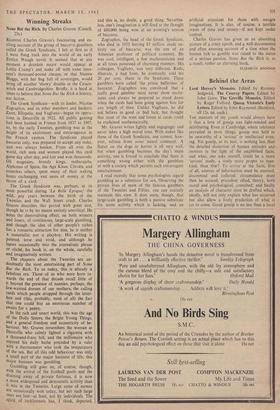Winning Streaks
READING Charles Graves's fascinating and ex- citing account of the group of baccarat gamblers called the Greek Syndicate, I felt at first as if I were flung back into the world of an early Evelyn Waugh novel. It seemed that at any moment a drunken major would appear at Lottie Crump's and make off with some inno- cent's thousand-pound cheque, or that Nannie Bloggs, with her bag full of sovereigns, would bring off another 'showy' double in the Cesare- witch and Cambridgeshire. Briefly, it is hard at times to believe that None But the Rich is history, not fiction.
The Greek Syndicate—with its leader, Nicolas Zographos, and its other members and backers, Zaret, Eliopulo, and Vagliano—began its opera- tions in Deauville in 1922. All public gaming had been banned in France from 1837 to 1907, so, by the early Twenties, gambling was at the height of its excitement and extravagance in the French casinos. The Syndicate played baccarat only, was prepared to accept any stake, and was always banker. From all over the world, rich men and women played this card game day after day, and lost and won thousands. Oil magnates, brandy kings, maharajahs, Alphonso of Spain, the Aga Khan, Citroen, and countless others, spent many of their waking hours exchanging vast sums of money at the throw of a card.
The Greek Syndicate was, perhaps, at its most powerful during 'La Belle Epoque,' the wild, gay years between the birth of the Twenties and the Wall Street crash. Charles Graves describes this period with great zest, though he is by no means entirely uncritical. He notes the demoralising effect, on both winners and losers, of continuous, large-scale gambling, and though the idea of other people's riches has a romantic attraction for him, he is neither a materialist nor a playboy. His writing is pointed, terse and vivid, and although he lapses occasionally into the journalistic phrase or cliche, his book is, on the whole, carefully and imaginatively written.
The chapters about the Twenties are un- doubtedly the most entertaining part of None But the Rich. To us today, this is already a fabulous era. Those of us who were born to- wards the end of that decade recall little of it beyond the presence of nannies, perhaps, the low-waisted dresses of our mothers, the calling cards which people dropped through the letter- box and (this, probably, most of all) the fact that one could buy an enormous number of sweets for a penny. In the rich and smart world, this was the age of the Dolly Sisters, the Bright Young Things, and a general freedom and eccentricity of be- haviour. Mr. Graves remembers the woman at Deauville who calmly lighted a cigarette with a thousand-franc bill, and the millionaire who enjoyed his daily bathe preceded by a valet with a thermometer who took the temperature of the sea. But all this odd behaviour was only a small part of the major business of life; this major business was gambling.
Gambling still goes on, of course, though, with the arrival of the football pools and the draining away of private fortunes, it is now a more widespread and democratic activity than it was in the Twenties. Large sums of money are occasionally won today, but not such large Ones are lost—at least, not by individuals. The spirit of recklessness has, I think, departed, and this is, no doubt, a good thing. Neverthe- less, one's imagination is still fired at the thought of £60,000 being won at an evening's session of baccarat.
Zographos, the head of the Greek Syndicate, who died in 1953 leaving £5 million made en- tirely out of baccarat, was the son of an Athenian professor of political economy. He was cool, intelligent, a fine mathematician and at all times possessed of charming manners. His colleague, Vagliano, was very different. Rude, illiterate, a bad loser, he eventually sold his 20 per cent.. share in the Syndicate. These gamblers were called 'the prima ballerinas of baccarat.' Zographos was convinced that a really good gambler must never show excite- ment and always be prepared to stand down when the cards had been going against him for any length of time. Unlike Vagliana, he did not believe in good or bad luck, but thought that most of the wins and losses at cards could
be explained mathematically. .
Mr. Graves writes lightly and engagingly and never takes a high moral tone. With stakes like those of the Greek Syndicate, one cannot, how- ever, refrain from some moral comment. A flutter on the dogs or horses is all very well, but when gambling becomes the day's main activity, one is forced to conclude that there is something wrong either with the gamblers or with a society which permits such extravagant entertainment.
I read recently that some psychologists regard gambling as a substitute-for sex. Observing the private lives of most of the famous gamblers of the Twenties and Fifties, one can scarcely maintain this view. It does seem, though, that large-scale gambling is both a passive substitute for some activity which is lacking, and an
artificial stimulant fdr those with meagre imaginations. It is also, of course, a terrible ,waste of time and money—if not kept under control.
Charles Graves has given us an absorbing picture of a crazy epoch, and a well-documented and often amusing account of a time when the human itch to gamble was raised to the status of a serious passion. None But the Rich is, as a result, rather an alarming book.
ELIZABETH JENNINGS


































 Previous page
Previous page